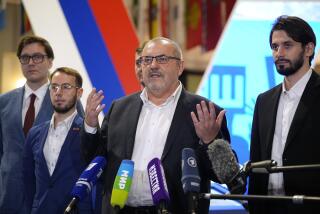MIDDLE EAST : Ex-Dissident Takes Social Stand in Israel Campaign
- Share via
JERUSALEM — Natan Sharansky was stepping down from the podium at a housing rally to make his way through a ramshackle camp of homeless squatters near the prime minister’s office when an Israeli woman shorter and stouter than he cut the famous Russian dissident off at the pass.
“Since you came from Russia, you have gotten a house, a car, everything you wanted,” said Amalia Fatkash, jabbing her cigarette in Sharansky’s face. Pointing to the shacks around her, she added: “You show me one Russian living in this place.”
Sharansky gave her a warm smile, a pat on the shoulder and assurances that the cheap hotels and trailers where Russian immigrants are housed after their arrival are also inadequate.
“There is no solution only for immigrants or only for veteran Israelis,” he said. “There must be a general policy to provide inexpensive housing for all Israelis.”
In a national electoral campaign dedicated almost exclusively to the issues of peace and security, Sharansky is running for parliament by trying to focus attention on social issues such as housing and immigrants’ rights.
After 10 years in Israel, this is Sharansky’s first campaign for public office. He is running on the ticket of the immigrants’ party he formed earlier this year, Yisrael ba-Aliya, whose main concern is to continue the in-gathering of the Jewish Diaspora.
“Israel must be a magnet attracting Jews with its quality of life, an economy that knows how to use the potential of all Jews and a system of civil rights that makes everyone feel at home,” Sharansky said recently at his campaign office.
Some Israelis have criticized Sharansky for forming his own party rather than working through an established political party. They charge that, by drawing immigrants into a separate group, Sharansky is contributing to their marginalization and failure to integrate.
But Sharansky, 48, responds that he spent the past decade trying to push the major parties to pay attention to immigrants. Labor and Likud, he says, have forgotten the Zionist ideal of in-gathering and have failed to provide adequately for the immigrants who arrived here in the past six years--more than 650,000 from the former Soviet Union alone.
“The existing political parties have their own priorities. Absorption and immigration are not even their second, third, fourth or fifth priority,” he said.
Immigrants to Israel receive far more help than in most other countries. In general, they are doing pretty well.
A majority of the Russians (they are called Russians no matter which former Soviet republic they came from) have jobs, and about half own their own homes.
Still, many are disappointed with life in Israel and their relationships with Israelis, which have been governed by stereotypes. Israelis often have dismissed Russians as gangsters and prostitutes, while Russians have looked down on native Israelis as uncultured. Israelis sometimes feel the immigrants are demanding too much--as did those at the rally--while Russians answer that all they want is equality.
Israel attributes much of its economic growth of the past few years to immigrants. But many of the Russians are highly educated professionals, and Israel has been unable to employ many scientists, engineers and musicians in their own fields. Instead, many work as supermarket cashiers, baby sitters and taxi drivers.
Like a good conservative, Sharansky blames thin on a rigid Israeli economy with too much control by the state, labor unions and monopolies. He says too much land remains in government hands, monopolies drive up prices, and small businesses are discouraged.
His policies on religious issues are closer to the left: He wants bus service on the Sabbath and civil marriage for those who are not able to marry under religious law.
For months, Sharansky has been crisscrossing the country in casual clothes and a green cap. He listened to the concerns of immigrants at new towns in the southern Negev region and in the northern city of Kiryat Shemona while it was under rocket fire from Hezbollah guerrillas in Lebanon.
Because Israelis will cast separate ballots for prime minister and parliament for the first time, political pundits give Sharansky’s party a chance of winning several seats in the 120-member body.
More to Read
Sign up for Essential California
The most important California stories and recommendations in your inbox every morning.
You may occasionally receive promotional content from the Los Angeles Times.













